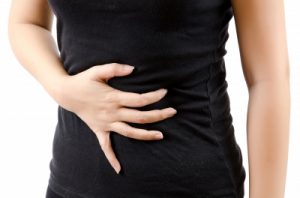
When people with chronic hepatitis B experience abdominal pain, we often wonder if it’s related to our liver and if our hepatitis B is getting worse.
According to experts, hepatitis B rarely causes abdominal pain. Here are some insights to help you understand what might be behind your abdominal pain when you live with chronic hepatitis B.
First, it’s not called the silent infection for nothing. When first infected, most children and nearly 70 percent of adults never experience any direct symptoms from hepatitis B. When people do have symptoms, such as aches, nausea and fever, they usually last for only a few days. Only a very small percentage have symptoms that persist long-term.
But chronic hepatitis B is different. Most of us have had this infection since childhood and over time it rarely causes us any symptoms. Usually, disease causes pain, it is nature’s way of telling us that a health problem is getting worse. However, with diseases such as chronic hepatitis B, diabetes or high blood pressure, we often don’t feel any symptoms until the disease reaches an advanced state.
Why doesn’t an infected liver hurt? The working part of the liver that filters toxins from our blood has nerves, but they lack feeling or sensory function. However, the membrane that encases the liver is sensitive. When the liver becomes injured or inflamed, it enlarges and pushes against the membrane, causing a dull pain. When a doctor probes or pushes an enlarged liver that’s pushing against this membrane, it feels tender.
This palpable “pushing” against the membrane is why fatty liver disease, for example, causes abdominal pain, while early-stage hepatitis B (with its minimal liver inflammation) does not. The “fatty” liver is enlarged from the fat that’s accumulated and its accompanying inflammation, it has literally outgrown its membrane.
Pain or discomfort from an enlarged liver usually occurs in the upper right quadrant of the stomach. It may also be felt in the right upper back and shoulder blade area.
When liver disease does cause pain: Liver cancer tumors can also push against the membrane, causing a painful sensation. If a tumor is large or if it has stopped the liver from functioning fully, we may also experience weight loss, lack of appetite, weakness and fatigue, and develop jaundice (yellowing eyes and skin). However, if a doctor is monitoring our health regularly with blood tests and ultrasound scans, you should know about this liver damage before it causes physical pain.
A reactivation of hepatitis B in someone who has had years of “inactive” hepatitis B, perhaps caused by toxins, chemotherapy or other diseases, may also result in some abdominal discomfort, fever, nausea and even jaundice.
Is that pain in my head, my liver or my gallbladder? The gallbladder may be the culprit behind abdominal pain because it is tucked in the lower area of the liver. The gallbladder is sensitive to inflammation, pressure, liver expansion and chemicals and can cause cramping, burning, and radiating pain. Because up to 50 percent of chronic hepatitis patients have gallbladder problems, gallbladder pain is often mistaken for liver pain.
A full abdominal ultrasound examination should be able to determine if the liver is inflamed or if gallstones are present. Surgery may be needed if the gallstones are large. If there are liver symptoms, ask your provider to order a spleen size and portal vein diameter as well.
Once liver or gall bladder inflammation is brought under control through surgery and/or treatment, abdominal pain should disappear. However, sometimes pain sensations continue even when the causes are controlled. Pain triggers in the brain cause this “ghost” pain if discomfort has occurred for an extended time. Scar tissue from old surgeries or liver injuries can also cause discomfort.
Bottom line: Abdominal pain may not necessarily mean that your hepatitis B is worsening. If you experience pain in any part of your body that affects your life, it is important to call your doctor immediately. Blood tests, ultrasounds and liver biopsies will ultimately show how your liver is doing and what is causing your discomfort.

